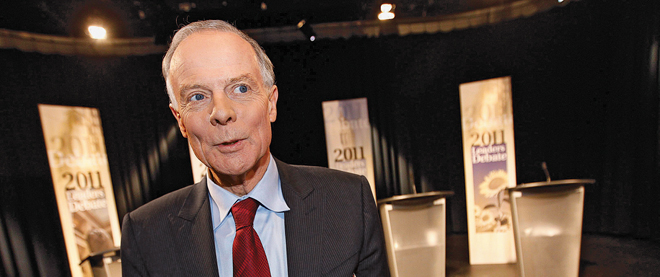The last Liberal standing in Manitoba
Provincial Liberal leader Jon Gerrard used his own car as a campaign bus
Trevor Hagan/CP
Share

Jon Gerrard looks down at his mushroom crepes and sighs. It’s not that breakfast isn’t to his liking, just the discussion accompanying it: the painful, post-mortem examination of an election that left the leader of Manitoba’s Liberals perhaps the loneliest man in Canadian politics. On Oct. 4, Gerrard’s party captured a sole seat in the provincial legislature—his own—and just 7.5 per cent of the popular vote. And his fellow Liberals didn’t even wait for the ballots to be counted before planting their knives firmly in his back. “It hurt and it had an impact,” he says, voice barely audible over the Sunday morning din at Winnipeg’s Pancake House.
In late September, when opinion polls showed the party dipping into single digits, Harry Wolbert, a member of the provincial executive and one of their few “name” candidates, started musing in the local media about electoral wipeouts and leadership reviews. Then two former federal Grit MPs, Anita Neville and John Harvard, publicly endorsed the NDP health minister—the principle target of Gerrard’s political attacks. “When it hit, it was a total surprise,” says the 64-year-old physician and one-time junior minister in Jean Chrétien’s cabinet. “I had spent the last 12 years being very concerned over what was happening in the health care system.”
“The media played it so high,” Gerrard’s wife, Naomi, a palliative home care nurse, chimes in from the other side of the table. “It was a bombshell, I thought.”
Not that the long-term trend was particularly encouraging beforehand. Manitoba’s Liberals haven’t held power since 1958, and even then it was as part of a coalition. Their share of the vote has been eroding since the late 1960s—with the exception of a blip under Sharon Carstairs’ leadership in the late 1980s, when they briefly formed the Opposition. The Liberals haven’t held official party status since 1995, and in the four elections since Gerrard took over in 1998, they have won a total of six seats. (Four of them being Gerrard’s own River Heights constituency.) The province’s politics have become polarized between the Tories on the right and the NDP on the left, all but freezing out the party of the centre.
Over his tenure, Gerrard has received high marks for his policy ideas and election platforms. “The Liberals have run arguably the most thoughtful, least hyperbolic campaign in this election,” the Winnipeg Free Press’s political columnist Dan Lett wrote shortly before the latest vote. “Their promises are realistic, new spending has been kept to a minimum and some of their solutions represent legitimate improvements over current policies and programs.” Which simply underscores the fact that the Liberal political brand has become virtually unsellable.
A party of one offers more hope than the five-year period in the early 1980s when there were no Grits at all in the legislature. But the reality is that Gerrard must stand each day and ask the permission of the other parties to speak. His motions, or amendments, can only be introduced with the help of a sympathizer on the opposing benches. The cash-strapped organization has just four staffers. And the Liberal campaign bus was Gerrard’s own red Prius with the coffee-stained seats.
Is the leader part of the problem? He’s a decent and thoughtful man, but is generally regarded as an awkward campaigner. Asked about the most exciting thing he has ever done, the doctor responds with a story about “working closely with John Manley” in Ottawa to connect rural Canada to the Internet.
Later on, in the car, he offers a couple of other alternatives—getting married on an island in northern Saskatchewan, followed by a wedding supper of bannock and caribou. He talks about his more than 40 years of work helping to protect and study bald eagles (he has co-authored two books on the raptors), proving his expertise with a loud and convincing eagle cry.
Still, Gerrard all but acknowledges his time as leader is coming to an end. The immediate priorities are thanking volunteers, paying down a $150,000 campaign debt (finishing with less than 10 per cent of the vote means no election funding rebate), and preparing for the next session, he says. Then his future. As a former medical researcher, Gerrard says he knows how difficult it can be to get people to accept new ideas. “But over time they come to understand how important they are and embrace them,” he says. The message succeeds, even if the messenger doesn’t.